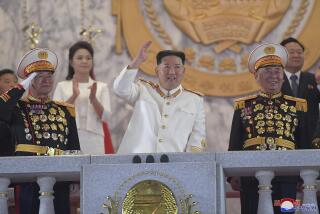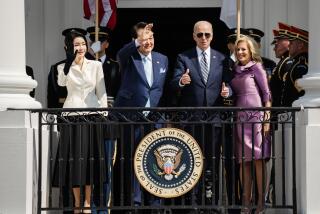Washington Avoids Active Role : U.S. Urges Dialogue and Compromise in S. Korea
- Share via
WASHINGTON — Reagan Administration officials, declining to take steps to actively promote democracy in South Korea, said Tuesday that a solution to the current crisis there can be reached only by Koreans themselves “through dialogue and a willingness of all sides to compromise.”
As demonstrations against the rule of President Chun Doo Hwan continued, State Department spokesman Phyllis Oakley said that the U.S. government has frequently urged South Korea to adopt a more open political system.
“We have often repeated our support for basic human rights, such as freedom of speech and peaceful assembly, as well as our opposition to violence and abuse of force,” Oakley told reporters.
‘Period of Transition’
Observing that South Korea, which has emerged from poverty to become an economic power, is going through a “period of transition,” she added:
“The only solutions likely to last are those which are worked by and for Koreans themselves and enjoy the broad support of the Korean people. We think that real progress can come only through dialogue and a willingness of all sides to compromise. Events of the past week demonstrate once again the pressing need for such a process.”
Although Oakley asserted that U.S. diplomatic contacts are being pursued on the “broadest range possible” with both the Chun government and dissidents, she was unable to give specific examples.
One complication has been the absence of Secretary of State George P. Shultz, who has been traveling abroad almost continually since the outbreak of civil strife in South Korea. Gaston J. Sigur Jr., assistant secretary of state for East Asian and Pacific affairs, was with Shultz in Manila on Tuesday, and they will not return to Washington until June 25.
Oakley quickly rejected an invitation to compare the South Korean crisis with the revolution that swept President Ferdinand E. Marcos from power in the Philippines last year.
“I wouldn’t care to speculate,” Oakley said. “It’s a very dangerous route to start speculation such as that.”
A government official who asked not to be identified said that internal conditions in South Korea are less favorable to revolution than circumstances in the Philippines a year ago.
South Korea, the official pointed out, is enjoying an economic boom and has witnessed the rise of a new middle class. As a result, some South Koreans fear that political ferment risks upsetting the prosperous economy.
The Philippines, by contrast, was an “economic basket case” in which political change carried virtually no risk to the mass of the population, the official said.
Also, the military threat posed to South Korea by Communist North Korea is far more serious than the challenge of Communist guerrillas in the Philippines. South Koreans have been acutely aware of the danger they might face if their government were destabilized and have acted accordingly, the official added.
“Of course there is a need for stability in such a situation,” the official said. “But if the only way of assuring it is through military rule, in the long run you’re on shaky ground and we’re telling them that.”
A critical factor in the ascendancy of Corazon Aquino to power in the Philippines was the support she received from the armed forces.
“The Philippine uprising wasn’t viable until the armed forces turned against Marcos,” the official said. “I don’t think there is a single informed observer of Korean affairs who believes the army is about to switch.”
More to Read
Sign up for Essential California
The most important California stories and recommendations in your inbox every morning.
You may occasionally receive promotional content from the Los Angeles Times.













